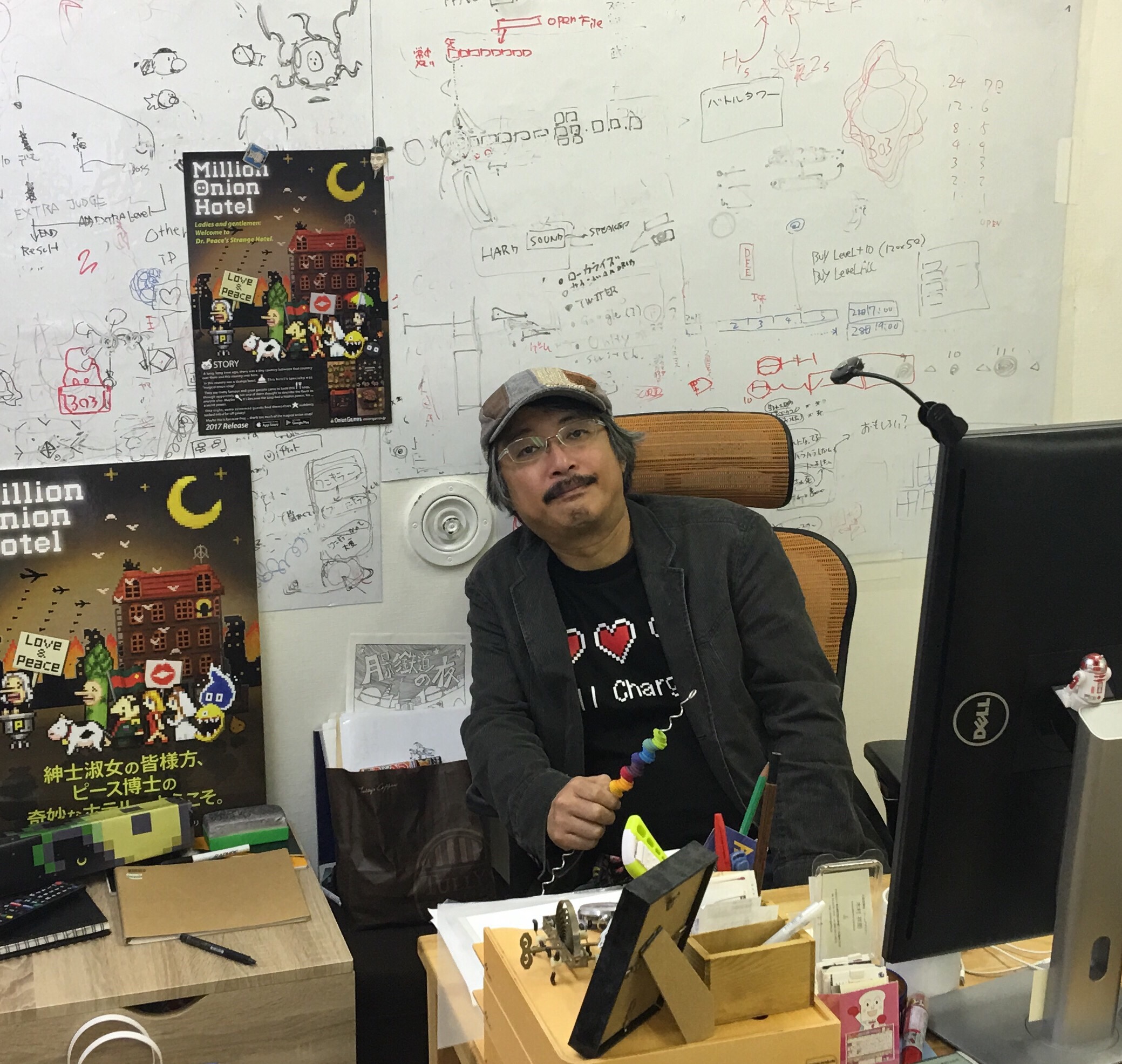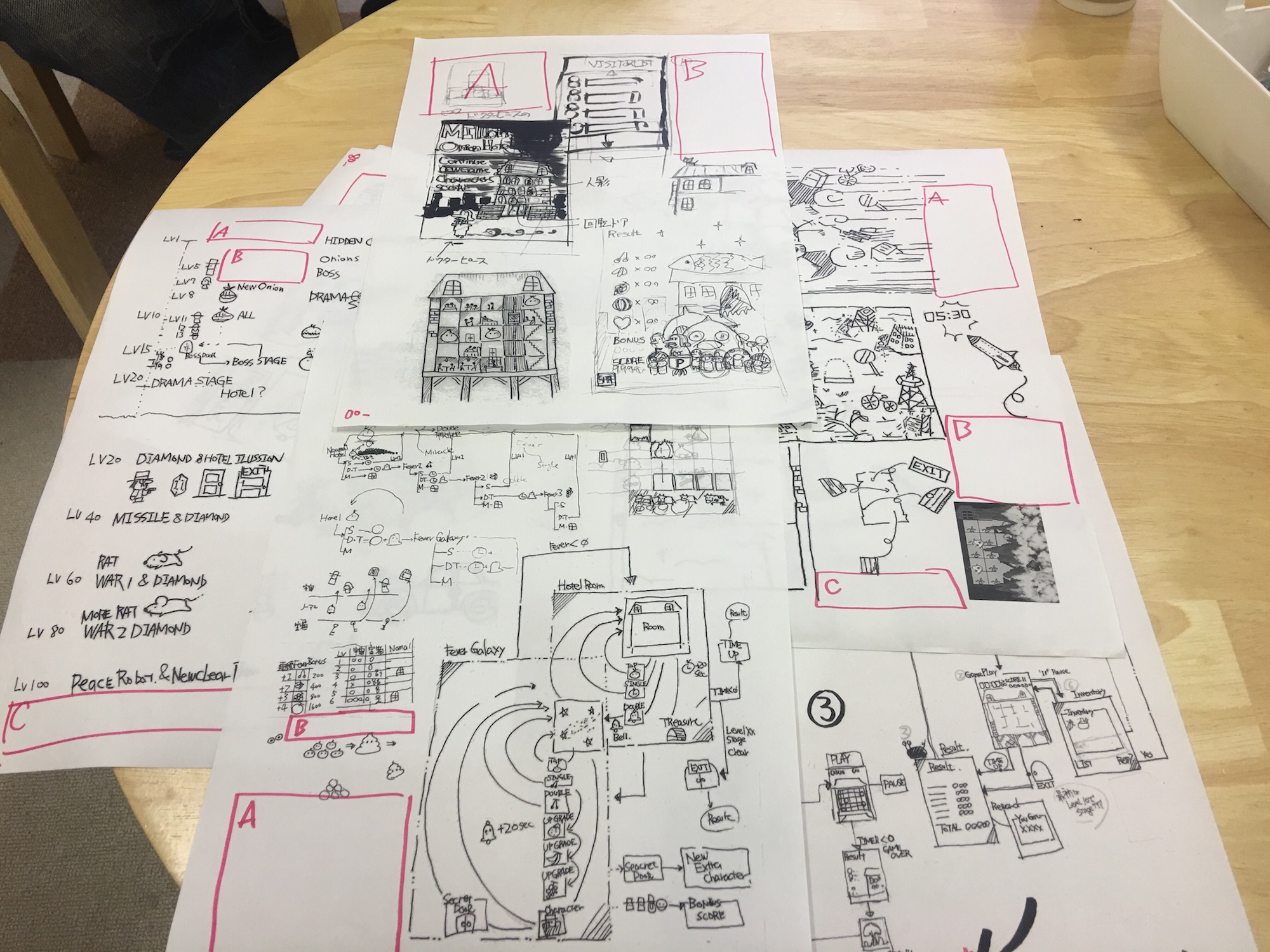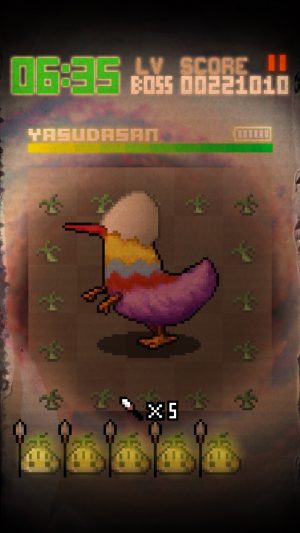 I was recently invited to visit the headquarters of Onion Games in Tokyo to have a sit-down interview with its founder, Mr. Yoshiro Kimura. Onion Games is the developer behind the recent arcade-puzzle game Million Onion Hotel ($3.99). They also released the quirky RPG Dandy Dungeon (Free) earlier this year. While Onion Games is somewhat new in the scheme of things, their staff has deep roots in the Japanese game industry. Mr. Kimura’s career alone stretches back more than two decades, and he’s worked with and for companies such as Square Enix, Marvelous Entertainment, and Sony Computer Entertainment. Many of his games are considered cult classics in Japan thanks to their refreshing approach to what can often be a very conventional form of media.
I was recently invited to visit the headquarters of Onion Games in Tokyo to have a sit-down interview with its founder, Mr. Yoshiro Kimura. Onion Games is the developer behind the recent arcade-puzzle game Million Onion Hotel ($3.99). They also released the quirky RPG Dandy Dungeon (Free) earlier this year. While Onion Games is somewhat new in the scheme of things, their staff has deep roots in the Japanese game industry. Mr. Kimura’s career alone stretches back more than two decades, and he’s worked with and for companies such as Square Enix, Marvelous Entertainment, and Sony Computer Entertainment. Many of his games are considered cult classics in Japan thanks to their refreshing approach to what can often be a very conventional form of media.
Like some of my other interviews, this one turned out to be rather lengthy. I’ve split it into two parts as a result. You can check back tomorrow for the second half. I’d also like to note that Mr. Kimura carried out this interview almost entirely in English, which is his second language. Please keep that in mind if anything seems unusual about his phrasing or the like. The unusual content, however, is all his. Now, let’s get on with the interview.
On the Difficult Question of Identity
TouchArcade (TA): Please tell us a little bit about yourself. Who you are, any work people might know…
Yoshiro Kimura (YK): When I introduce myself, I say I am Japanese video game designer, Yoshiro Kimura. I’ve already spent twenty… twenty-two years in the Japanese game industry.
TA: Quite a while.
YK: Yes. My first job was on Romancing SaGa 2. After that, I quit my job and joined a small team called Love-de-Lic. It was a… we were said to belong to a ‘subculture’. After that, I had some unusual times in the Japanese game industry, because I was a freelancer. I didn’t belong to any particular company. I just worked with people I wanted to work with. I remember, for example, I worked for Marvelous Entertainment, with Wada-san and Suda-san (Shaun’s note: Yasuhiro Wada is the creator of the Harvest Moon series, and Goichi Suda is the director behind Killer 7 and No More Heroes among many others) on No More Heroes and Little King’s Story. Those were happy times. I was working as a producer, as a director. It was good. But after that, I felt… how should I say this? A lot of social games suddenly appeared.
TA: Yes.
YK: It was 2011 or 2012. Uh, I wanted to run away from this new game situation. I hate that kind of game. That’s why I’ve almost… banished myself. (laughs)
TA: Okay. A little self-exile? (laughs)
YK: Yes, yes, yes. I ran away to Paris, and other places. Staying at my friends’ houses, living together. I used a small computer and made games myself, alone. More happy times. (laughs) Anyway, it was like that. In Japan, I call myself a traveler and a game designer. I love being a game designer, but I also sometimes want to run away from the game industry and I want to go around the world. Still now, I want to run away! But I’m still making games, and I have no idea why.
TA: Yeah, you are!
YK: You know, I want to pretend that I’m a self-assured guy. I should do that in front of an interviewer! But I can’t do it. I’m still like this.
TA: That’s okay. I think a lot of people are like that.
YK: I’m already 48 years old, but I still say I’m ‘indie’.
TA: Hey, indie’s the new cool. There are a lot of people who used to work for the big companies who have gone indie now. I’ve noticed that trend especially in Japan.
YK: What I am… you know, this question is very strong. What am I? (laughing)
TA: (laughing)… Okay well, that was a pretty good introduction because you actually checked off my second question, too. My next question…
YK: Okay!
TA: So you decided to go indie, and I kind of understand your thinking behind that. You didn’t like where the new games were headed, you didn’t like the whole social gaming idea, it didn’t seem like a good fit for you, maybe? So… why mobile games?
YK: Wow! (thinks for a few seconds) Why? People say that there are no core games on mobile. So I felt, hey, I can make those! I can do this! You know, when Puzzle & Dragons appeared, people said, “This is a game! And also a social game! It’s very good!" I was thinking, “I can make something better."
TA: Okay! (laughing)
YK: At that moment, my favorite game was Dungeon Raid. And Threes! ($5.99). These two games showed me a new horizon, that I could make a good game for this machine. I don’t know why people say mobile games aren’t good, or aren’t games. But I can make them. Million Onion Hotel is a… real game, an arcade game.
TA: It is, it really is. I’ll get more into it later, but it’s interesting that the two games from Onion Games so far are very different styles of games. But I’ll get to that later.
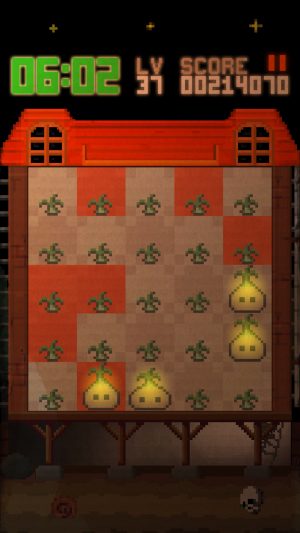 On the Many Layers and Uses of Onions
On the Many Layers and Uses of Onions
TA: Okay, well here’s my first… maybe strange question. You talked about how you were going to go indie, but how did Onion Games start, and also, why onions?
YK: Mmm. Onions. There are several reasons. But first, I should explain why I started Onion Games, right?
TA: Yeah, if you could.
YK: After I wandered around the world wondering what I should do, who I was, things like that, I arrived at San Francisco, at the GDC (Shaun’s note: Game Developer’s Conference). I saw IGF 2012 (Shaun’s note: Independent Games Festival). It was shocking! I didn’t know this culture existed. Of course there are a lot of strange games on Windows or Mac that people make for free. I know people can make games anytime, anywhere. But I didn’t think many people were interested in that. You know, this minor culture.
TA: Right.
YK: But when I arrived at IGF, there was a big screen, and Brandon Boyer (Shaun’s note: Brandon Boyer was the chairperson of the IGF from 2010 to 2015) was talking proudly. He was talking about Spelunky, Fez, and games like that. Suddenly, colorful, vibrant games appeared in front of me. A natural landscape. Rocky mountains, going to the jungle with animals, and so on. Without realizing it, I was crying in front of that screen. I was… when I talk about this, it still makes me cry. (Shaun’s note: Kimura really did start to tear up here.)
TA: Wow!
YK: It was shocking, really. The people were so happy in front of those strange games. There were only strange games, but people were loving it. In that moment, I asked myself why I wasn’t doing this? Why couldn’t I do this? Why was I giving up making games? I should do this, too. And I can do it alone. I thought so. I came back to Japan and told my friend that I could start making games again, by myself, alone. But it was ridiculous. You know, I can program a little bit, I can draw a little bit, but I can’t do those things well. My skill is direction. I’m a director.
TA: Mm-hm.
YK: Slowly, I gathered people. The first team members numbered three. Me, Kurashima-san, and Ikeda-san (Shaun’s note: Kazuyuki Kurashima is an artist who worked on many games including Super Mario RPG, Live-a-Live. Tom Ikeda is a game designer who also worked on a number of games including Little King’s Story and Lollipop Chainsaw). Then one person appeared, and another person, and then a musician. The first step we took was making Whack-a-Mole. Just a straight version of Whack-a-Mole. You know Whack-a-Mole, right?
TA: Yeah.
YK: One programmer showed me a game, saying “I made Whack-a-Mole with your onion. Isn’t this happy? Don’t you think so?" It was just Whack-a-Mole. (laughs) But I was so happy, because my onion was moving around. That was a very important day. It was a first step. So then I joked, asking if we could build this better? Suddenly, I got the idea of making lines, and of a story about a doctor named Dr. Peace. Dr. Peace’s strange story. I started drawing things. That was 2013. Now, it’s 2017. It took too long! But that was an important day. What was the question? When I speak English, I always forget the complete question! (laughs)
TA: Well, I asked about the making of Onion Games, which I think you covered. But also, why onions? Where does the onion come from?
YK: Yes! Maybe it’s because of the tear that came from my eye unknowingly at GDC. You know, when you cut onions, the same thing happens. Or maybe it’s because my favorite food is onion, all the way from childhood.
TA: Well, that’s kind of poetic! I only recently started liking onions. Most of my life, I didn’t like onions.
YK: Really?
TA: Until I moved to Japan. Of course, when I first moved here, I couldn’t speak the language well, so I wasn’t able to make special requests at restaurants or anything. So I just had to start eating them, but gradually I came to like them.
YK: Onions have a sweet taste, don’t they? I like that element. One second, please.
(Mr. Kimura stands up and goes over to his desk to retrieve something. When he comes back, he puts a bunch of design documents for Million Onion Hotel on the table in front of me.)
YK: On that day when I saw the Whack-a-Mole game, I drew these.
TA: Oh wow, there are so many design documents here. Let me move my coffee away, these are precious.
YK: These are copies, so don’t worry. I drew these characters, and then Kurashima-san did the pixel art of them.
TA: This is great… hey, there’s the cow!
YK: Yes, the cow existed right from the first moment.
TA: I love the cows!
YK: People ask me why! (laughing) I don’t know why.
TA: You don’t know why? (laughing)
YK: I have no idea! My first image was of cows walking in space, so I thought the galaxy mode should be like this.
On Inspirations and Secrets
TA: So I would say that most of the games that you worked on, at least the ones I’m familiar with, are fairly unusual games. They’ve got a certain quality to them that is uniquely yours, I think. How do you come up with the ideas for these games? If you can talk specifically to Dandy Dungeon and Million Onion Hotel, I think that’s most relevant to our readers. But just in general, how do you come up with this wild stuff?
YK: My ideas? It’s quite hard to explain. But I’ll try. When the idea comes… no, why? Sometimes, I can’t come up with any ideas. I stop and paralyze like I just did there. It’s up to my mind, really. The best conditions are when my life is hard, but I’m still active, and I can attack back against life. Also, if I’m healthy and humble at the same time. Then suddenly, ideas come when I’m just walking down the road. That’s probably the best I can do about explaining it.
TA: Okay, well that’s not bad. So would you say that your ideas tend to come to you when you’re walking? Is that your thinking time?
YK: Walking, drinking coffee. Hmm…
TA: I think that’s about as much anyone can explain their ideas, so don’t worry too much.
YK: Yes, but making my ideas… this is my first time talking about this. The most important thing for me is to do something. Writing, or drawing, and such. While I’m working like that, nothing comes. But if I stop working and take a walk, then things come to me.
TA: So it’s kind of like peaks and valleys?
YK: Yes, yes, yes. I want to make my body work hard all the time, and then relax after that. This is an important relationship to me. I think this is the secret of my style. (laughs)
TA: Well, I’m going to tell everyone your secret, bwa ha ha ha. (laughs)
YK: I don’t know!
On Million Onion Hotel and What it Means
TA: You guys have been working on Million Onion Hotel for quite a while now. I saw it for the first time at the Tokyo Game Show in 2014, I think. Your booth was very busy at that time, so I couldn’t come in and talk to you, but I checked it out.
YK: You came?
TA: Yeah, I wrote an article about it at the time.
YK: Thank you! You were the first one, I remember! Not many people were writing about Million Onion Hotel at that moment.
TA: Well, I recognized your name, and a lot of my friends told me that I had to check it out. So I did! But anyway, you’ve been working on this for a while, and it’s finally released. Dandy Dungeon is out, too. What’s next for Onion Games?
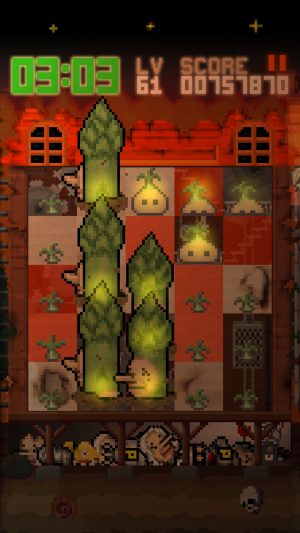 YK: What’s next? Maybe we can continue to make games, but I have no idea. If Million Onion Hotel sells well, then I can make one more, and one more, and so on. But I still don’t know.
YK: What’s next? Maybe we can continue to make games, but I have no idea. If Million Onion Hotel sells well, then I can make one more, and one more, and so on. But I still don’t know.
TA: That’s the indie life, I guess.
YK: You know, to eat food, I must work. We must. Like with DMM (Shaun’s note: DMM is the publisher of Dandy Dungeon), we need to find a collaborator with money. But the problem is that I want to make my own game ideas. I don’t care about rights or IP, or who publishes or not. I just want to make my games. This is the most important thing. The best way is being indie. In the world indie culture, there are a lot of famous small teams. I want to become like that.
TA: Well, I hope you can reach that goal. That kind of creative freedom is really important.
YK: Sometimes good people with money show up around me. But to tell the truth, I want to make games that are pure, 100% my ideas, without other pressures.
TA: It’s tough finding money people that will let you do that.
YK: Yes.
TA: So maybe it’s just me, but when I play your games, I definitely feel a deeper meaning to them, or a deeper emotion to them sometimes. It feels like a lot of your games are about love, and how powerful that can be. That’s just my takeaway. But as a creator, what do you hope that people can take away from your games?
YK: Ultimately, I shouldn’t speak about this. People should just feel what they feel from my games. What I can say is… love and peace.
TA: Love and peace. Okay! That’s a good answer, and it ties in well with Million Onion Hotel, which everyone reading should buy right now. (laughs)
YK: Yes! (laughs) You know, this is one of my bad points, but also one of my good points. I love to write irony. And I also like to draw pretty characters. And I love love stories. Sex, abnormal things. I like all of that. I don’t know what people feel, but… (shrugs)
TA: It’s interesting that you say that you like to draw beautiful characters, but the characters in your game tend to be unconventional and, you know, not so beautiful on the surface. I mean, I can relate to Yamada-kun (Dandy Dungeon‘s hero), but you know…
YK: Yeah, people say so! You know, in my mind, Yamada-kun is beautiful. When I say ‘beautiful’, it’s different from when most people say it.
TA: I kind of get you. Yamada-kun is a beautiful spirit.
YK: What people call ‘handsome’, ‘beautiful’, a ‘cool guy’, a ‘beautiful woman’… you know, people have a stereotypical figure in mind, right? Of course, I have the same. I love Hollywood actors. I love Harrison Ford. Wolverine. I love them. But when I come back from a Hollywood movie to the real world here in Japan, I can see, around me, a lot of faces. A lot of body types. Beauty is not one style. As I said, when I saw the IGF presentation, it was like an animal jungle, and it made me cry. That might be related to this. Maybe to me, beauty is… how should I say this… diversity.
TA: Diversity. Okay.
YK: There are a lot of kinds of human figures and characters, and when I see a lot of diversity at one time, I feel that is beauty. I love them all. This is very important, and that’s why in my games, there are some unusual characters.
TA: They are very diverse. I don’t feel like any of the characters in your games are copies with different heads on them, right? That’s nice. You know, I love Yamada-kun. He’s so strange, but so pure.
YK: At Bit Summit (Shaun’s note: Bit Summit is an annual major indie games festival in Japan), people always call me Yamada-san. I’m not Yamada-kun, I’m Kimura! (laughs)
On Favorite Games and Other Joys
TA: You’ve already mentioned some of the mobile games you like: Dungeon Raid and Threes!. Do you have any other favorite games? Not just mobile, but in general.
YK: Yes, I do. Quite a lot, actually. Too many.
TA: I would hate to have to answer this question myself.
YK: Yeah, this is a very difficult question. I’ve been living for 48 years already. (laughs) A lot of games are released every year! I’m not a maniac about playing games, but 48 years is a long time. For example, recently my favorite game is Mushroom 11. It was wonderful. It was quite strange, but well-realized and with a new dimension. I love that. But my soul came from a long, long time ago. Like… how old are you? Thirty-something?
YK: So in that case, you know Namco’s games like Mappy, Xevious, and so on? I lived in the 1980s and I love older games, so Million Onion Hotel is quite similar to Namco’s classics. No one says so! But I feel it’s the case.
TA: I noticed a lot of arcade inspiration in Million Onion Hotel. It’s one of the differentiating points from Dandy Dungeon. I could really feel, when playing Million Onion, that this is an arcade game.
YK: Yes!
TA: Our readers were asking if it was a roguelike, or if it was an RPG? No.
YK: There’s no relationship to role-playing games, no. No one makes games like these now.
TA: They’re hard to find. Mobile is really the main place for them now.
YK: Anyway, my game history. My favorite games. Oh, I thought of something! Lode Runner! Doug Smith!
TA: Alright, Lode Runner!
YK: That was the first time I made an imitation game. When I saw Lode Runner on Apple, I made my own version of it on a Japanese computer. Just by eyeballing it. I did it when I was 13.
TA: That’s cool, that’s cool. Wow, you got started early.
YK: Yeah. That was my first step towards making games. But really, my favorite game is one I’ve already said. I’m a huge fan of Threes!. I want to show you my score.
TA: I want to see this. It’s probably higher than mine. I always play it just before bed. But I usually end up falling asleep with the phone in my hand.
(Mr. Kimura shows me his score on his iPhone)
YK: It’s quite high!
TA: Oh my… 252,645 points!
YK: It’s high, right?
TA: Oh, I’m shamed!
YK: I’m trying to match this number. (pointing to the highest-value tile on the board) I would love to show this score to the people who made this game.
TA: I think they read TouchArcade, so they will probably know now.
YK: I think I saw one of the creators at Indiecade! I was in awe, thinking “you’re the one who made this!"
TA: Yeah, it’s a great game. I feel bad for the developers because of all of the copycats.
YK: This is THE puzzle game. Copycats can f*** off!
TA: (laughing)
YK: This is… this game is… okay, the puzzle part is clever with the swiping system. My favorite thing is the music and the sound effects.
TA: Ah, the way the characters say hello, and stuff?
YK: Hello! Yes. And the music is low-tempo. (starts humming the Threes! background music) That’s really nice. They have good design sense.
TA: Yeah, that music is burned in my brain. You can see some common points, though. One of the things that makes Threes! so great is just that there are a lot of little touches that make it feel like a living experience. You mentioned how pieces talk, and they animate a little, and so on. I think that’s in your games, too. All the little parts feel alive.
YK: Wow! Thank you very much!
Thanks to Mr. Kimura for his time and kindness. Be sure to check back tomorrow for part two of the interview, where we discuss Mr. Kimura’s design philosophy, the mobile market, and the special power shared by all of humanity, among other topics. Yes, things took some interesting turns. Thanks for reading!
We pride ourselves on delivering quality, long-form articles like this one instead of the SEO-driven click bait that is slowly taking over the internet. Unfortunately, articles like these rarely generate the traffic (and as a result, the ad revenue) of listicles, cheat guides, and other junk.
Please help us continue producing content like this by supporting TouchArcade on Patreon, doing your Amazon shopping by first visiting toucharcade.com/amazon, and/or making one-time contributions via PayPal.
